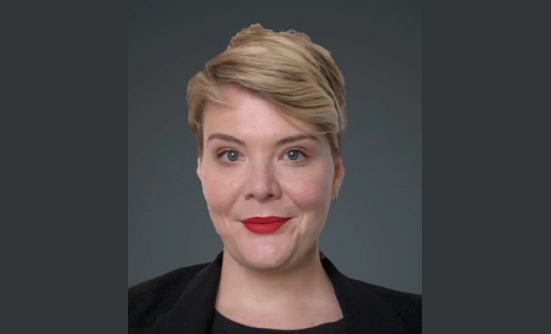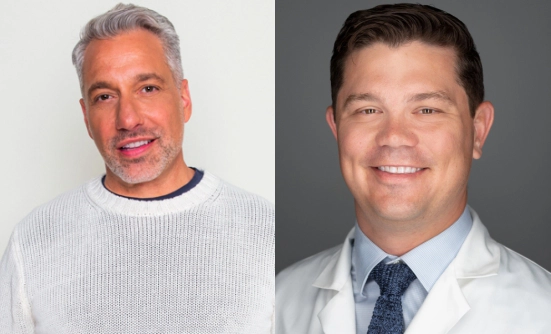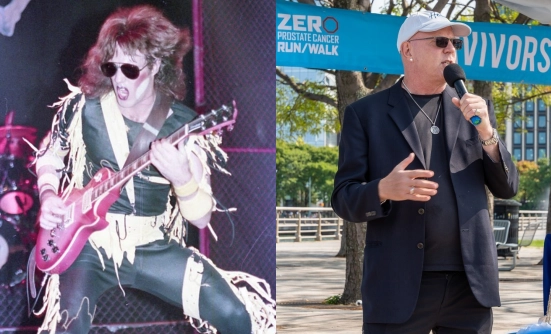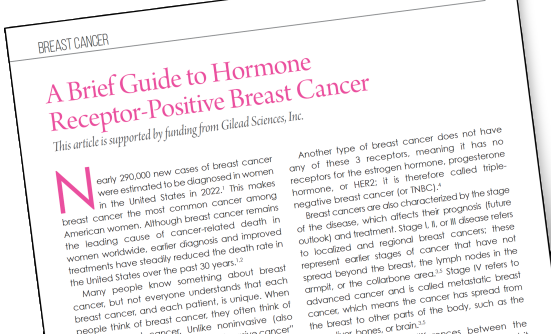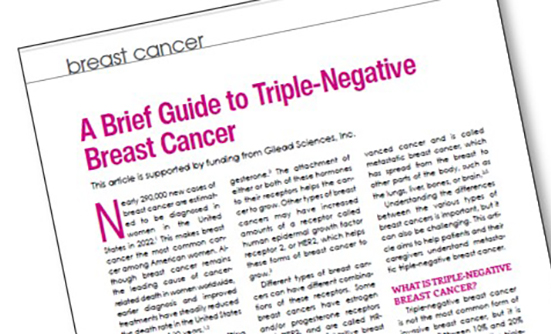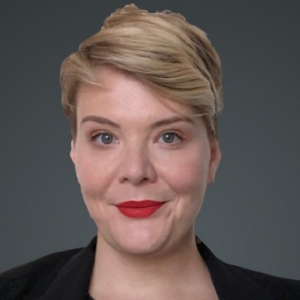
Over 20 years ago, the Young Survival Coalition (YSC) was founded. It was 1998 in New York City, where a group of young women gathered and established a group unique to them. What was unique about these survivors? Each was diagnosed with breast cancer before the age of 40 years.
Through their connection, they realized they shared many of the same challenges and that these challenges were related to their phase of life. They also recognized that young adults were underrepresented in breast cancer research, in breast cancer communities, and in conversations about breast cancer. They acknowledged that young adults with breast cancer face higher mortality rates, fertility issues, and ramifications of early menopause unlike their older counterparts. And finally, they realized the need for an organization to address these needs of young adults; and now, more than 20 years later, these needs still define YSC’s work.
I was fortunate to have the opportunity to speak with Jamie Larson from the YSC about the many programs offered by their organization and the important work they are doing to improve the lives of young adults diagnosed with breast cancer as well as the people who support them. What follows is our thoughtful exchange.
How would you describe the mission and goals of the YSC?
Our mission is to work toward a world in which no young adult faces breast cancer alone. We do this by creating a community to address the unique needs, amplify the voice, and improve the quality of life of young adults affected by breast cancer.
What are some of the support programs YSC offers?
We are so pleased to facilitate in-person support groups called the Face2Face Network—or F2F for short. We facilitate more than 170 F2F groups in 34 states. These groups provide support and resources for young adults at all stages of a breast cancer diagnosis, treatment, or recovery.
Survivors and their caregivers are welcome to join a group in their area; a listing of groups is available on our site (youngsurvival.org/meet-in-per son); but if an in-person group is not an option, I can tell you that we have a vibrant online community that so many young adults take advantage of.
For example, YSC Virtual Hangouts allow young survivors and thrivers to connect with others from the comfort of their own home. They can connect with their peers, who may share a similar diagnosis, life experiences, or treatment type. Joining a Virtual Hangout is really easy! You just need a computer, tablet, or phone with a webcam and an Internet connection. Groups include Virtual Hangouts for all survivors and thrivers, those living with metastatic breast cancer, African American survivors and thrivers, male co-survivors, and survivors and thrivers part of the LGBTQ+ communities.
We also have private Facebook groups with active communities where young adults support each other and share their experiences. This is a great place to ask questions or share personal stories with people who get it. We have 4 private groups: one for all young adults diagnosed with breast cancer age 40 years and under, one for those living with metastatic breast cancer, one for the LGBTQ+ community, and one for co-survivors.
We also have our YSC Peer Mentoring that connects young adults one-on-one with a peer mentor who shares a similar diagnosis, life experience, or treatment type.
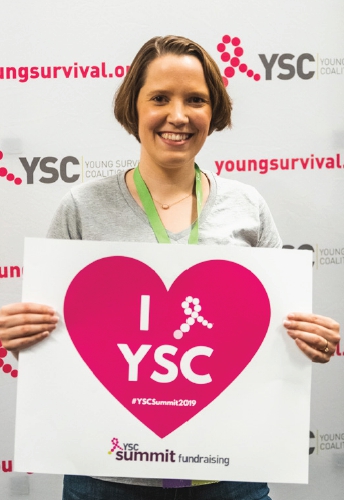
You also host conferences, right?
Yes, in fact, we host the YSC Summit, which is the largest breast cancer conference dedicated exclusively to the young adult breast cancer community. This 3-day conference features inspirational speakers, workshops addressing their unique issues, and interactive wellness activities. Attendees will have access to the most up-to-date, evidence-based information and tools and have the opportunity to connect with a community of other young thrivers and co-survivors from across the world.
What are some of the unique challenges young women face when diagnosed with breast cancer?
There are many. Just off the top of my head, young women in general tend to have more aggressive forms of cancer. They are underrepresented in research studies. There can be unique challenges concerning finances, insurance, and child-rearing. Their quality of life can be impacted by early-onset menopause. There can be fertility issues, body image issues, and relationship and dating issues.
It’s for all these reasons that YSC exists. Our community focuses on the issues facing young adults and helps to raise awareness, improve representation in research studies, and just to encourage all young adults with a breast cancer diagnosis.
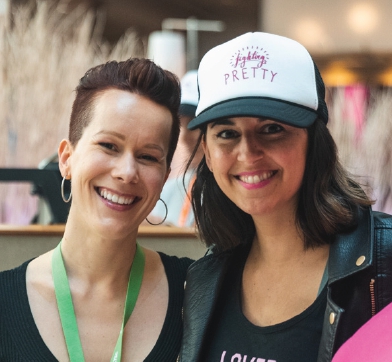
YSC offers many educational materials on its website. We are very interested in the “Navigator” booklet series. Can you talk about the creation of these materials and how breast cancer survivors are benefiting from them?
The Navigator Series was created to provide a comprehensive guide to the different phases of a breast cancer diagnosis. The series includes 4 separate guidebooks.
The first in the series is called the Newly Diagnosed Navigator. It was created to educate and empower newly diagnosed young adults and includes an easy-to-understand breast cancer glossary, a list of questions to ask healthcare teams, and inspiring messages from young adults who have already been down this road.
The Post-Treatment Navigator was designed for those who have completed their active breast cancer treatment. It provides tips to manage the posttreatment phase with a survivorship care plan to use with their healthcare team. It also includes practical information about sex and intimacy concerns, family planning options, and long-term side effects like “chemo brain” and lymphedema.
The Metastatic Breast Cancer Navigator promotes a greater understanding of living with stage IV breast cancer. It includes various treatment options and provides advice on working with healthcare teams, along with forms and tools to help stay organized.
The Long-Term Navigator was developed specifically for young adults with a history of breast cancer and includes tips and information about how to manage long-term side effects and move forward with life after diagnosis and treatment. This guidebook is especially useful for individuals who completed treatment 5 or more years ago.
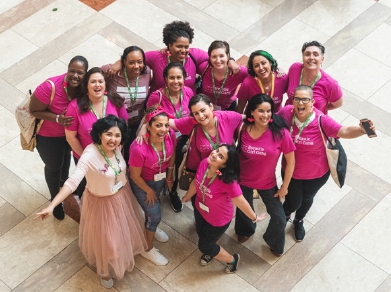
YSC also focuses on the caregiver, or the co-survivor. Can you define the term “co-survivor?” What advice do you have for them?
Yes, YSC definitely touts the importance of caring for co-survivors. A co-survivor is anyone who offers the crucial emotional, physical, financial, or spiritual support to a young adult diagnosed with breast cancer. This can include partners, parents, siblings, friends, extended family, or others. Co-survivors need support just as much as the person diagnosed with cancer. Their needs are often overlooked in their caregiving role, but it’s necessary that they take care of themselves in order to provide the support their loved one needs.
How can a young adult diagnosed with breast cancer connect with YSC?
Simply visit our site. They will find a wealth of resources there and many opportunities to connect with other survivors. We can be found at youngsurvival.org.





